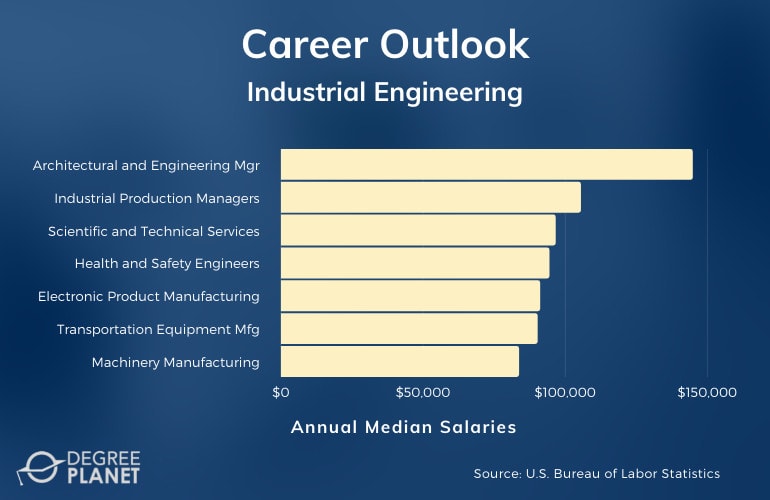Is industrial engineering a good major? If you are interested in engineering and are trying to choose a specific degree program, you may be asking yourself this very question.

Today we will discuss what it’s like to get a major in industrial engineering and what careers are available for industrial engineering majors.
Editorial Listing ShortCode:
Hopefully, this article can help you decide if a bachelor in industrial engineering is right for you.
Is Industrial Engineering a Good Major?

Yes, industrial engineering is a good major for many undergraduate students. Jobs in the architecture and engineering field are projected to grow at a rate of 3% in the next 10 years (Bureau of Labor Statistics), as fast as the average job growth for all occupations.
Common industrial engineering careers in this field include industrial engineer, industrial production manager, health and safety engineer, and architectural and engineering manager. Current projections from the Bureau of Labor Statistics indicate that the field of industrial engineering will grow very rapidly over the next decade.
Editorial Listing ShortCode:
The number of jobs for industrial engineers is expected to grow by 10% through the next decade, much faster than the average growth rate for all occupations.
Many different industries employ industrial engineers to make their manufacturing processes more efficient. Because of the fast growth expected in this industry, industrial engineering majors should have many career opportunities available in the future.
Industrial Engineering Major Curriculum

Here are some common examples of different subjects that might be part of the curriculum in a bachelor in industrial engineering program. These subjects mostly pertain to applied mathematics, physical sciences, and technology.
- Probability and Statistics
- Operations Research
- Applied Behavioral Science
- Engineering Economy
- Computer Programming and Data Management
- Economics and Finance
- General Business Management
- Mathematical Sciences
- Production and Logistics
- Statistics and Quality Control
As you may have noticed, a number of these core courses are shared by other engineering disciplines since courses like mathematics and statistics are just as important in industrial engineering as they are in software engineering, computer engineering, or civil engineering. Of course, the exact course names and requirements may vary across different colleges and universities. So, you may want to look at the requirements for the specific school you are interested in attending.
5 Things You Can Do with an Industrial Engineering Degree

Industrial engineering is not as specialized as most other types of engineering, so an IE major could prove useful a variety of industries.
Industrial engineers usually work to streamline manufacturing processes to be as efficient as possible to help companies save time and money. The following are the top industries in which industrial engineers work.
1. Professional, Scientific, and Technical Services

The professional, scientific, and technical services sector includes people who provide any sort of customized, knowledge-based services.
Industrial engineers who are employed in this sector typically work for engineering firms that provide services and consulting to other companies. Working in this sector requires a high level of expertise.
2. Computer and Electronic Product Manufacturing

Industrial engineers who work in computer and electronic product manufacturing figure out how to make the manufacturing process as efficient as possible.
They look for ways to minimize costs and maximize output while ensuring that products meet high standards of quality control.
3. Transportation Equipment Manufacturing

In the transportation equipment manufacturing sector, industrial engineers study and solve problems in the manufacturing processes behind different types of machinery used for transportation.
Automobiles are the most common type of transportation equipment in North America, but industrial engineers employed in this sector might also work on the manufacturing of trains, ships, or even aerospace equipment.
4. Machinery Manufacturing
Industrial engineers who work in machinery manufacturing figure out the most efficient ways to manufacture machinery for agriculture, construction, mining, heating and air conditioning systems, metalworking, and other general purpose machinery.
Editorial Listing ShortCode:
They may spend time working in both offices and factories as they analyze production processes.
5. Fabricated Metal Product Manufacturing
Fabricated metal product manufacturing refers to the manufacturing of metal products other than machinery.
This industry includes but is not limited to the manufacturing of knives and cutlery, metal tools and hardware, spring and wire products, and architectural and structural metals. An industrial engineer working in this sector would need to be knowledgeable about processes such as welding, stamping, bending, and forging.
Industrial Engineering Careers

According to the Bureau of Labor Statistics, the following occupations are related to industrial engineering.
| Careers | Annual Median Salaries |
| Architectural and Engineering Managers | $149,530 |
| Industrial Production Managers | $108,790 |
| Industrial Engineers, Professional, Scientific, and Technical Services | $98,680 |
| Industrial Engineers, Computer and Electronic Product Manufacturing | $94,700 |
| Health and Safety Engineers | $94,240 |
| Industrial Engineers, Transportation Equipment Manufacturing | $91,790 |
| Industrial Engineers, Machinery Manufacturing | $84,780 |
| Industrial Engineers, Fabricated Metal Product Manufacturing | $77,940 |
| Logisticians | $76,270 |
| Cost Estimators | $66,610 |
Industrial engineering is not as specialized as some other types of engineering. So, there is a wide variety of jobs available for IE majors. Most of these jobs also pay well.
How to Know If a Degree in Industrial Engineering Is Right for You

Industrial engineering involves creative problem solving, extensive knowledge of technology and manufacturing processes, and applying theoretical knowledge to real world situations.
A BS in Industrial Engineering (BSIE) may be right for you if you love looking for ways to make processes more efficient and cost effective and love learning about complex technology.
Industrial engineers often have to be team players as well. Collecting information about problems and coming up with solutions usually involves working with other people. Industrial engineers can work in many different industries, so this degree may be a good fit for you if you want an engineering degree that is versatile.
What Can You Do with an Industrial Engineering Degree?

Industrial engineers are involved in the manufacturing of almost everything, from auto parts to agricultural equipment and electronic devices.
Almost every major industry has a need for industrial engineers in manufacturing and production, and there is a growing economic demand for this position.
Editorial Listing ShortCode:
The most common sectors for industrial engineers to work in are computer and electronic product manufacturing, and transportation equipment manufacturing, and professional, scientific, and technical services.
What Do Industrial Engineers Do?

Industrial engineers devise systems for companies to provide goods and services to their customers. Industrial engineers work to minimize waste, cut costs, and maintain quality control.
As an industrial engineer, you may need to confer with the management of a corporation to understand product specifications, production schedules, and existing limitations. Limitations may include the size of a manufacturing plant or the amount of physical material available for manufacturing products.
You might analyze an existing system, look for ways it can be improved, and then make suggestions to the management about what might need to be changed.
Where Do Industrial Engineers Work?

Industrial engineers can work in many different settings. Although you can work in an office, you may sometimes need to spend time in the places where you are trying to solve problems.
You might need to spend time at a factory or manufacturing plant, physically observing what is going on. You may then need to go back to a corporate office to run data or speak with executives about possible changes and improvements.
How Much Does an Industrial Engineer Make?

According to the Bureau of Labor Statistics, the median annual wages of industrial engineers in general is $88,950. Annual wages typically fall within a range of $57,950 and $136,930.
Industrial engineers working in the sector of professional, scientific, and technical services earn a median annual wage of $98,680. In the transportation equipment manufacturing sector, they earn a median annual wage of $91,790.
Industrial engineers in the fabricated metal product manufacturing sector earn a median annual wage of $77,940.
Does Industrial Engineering Have a Future?

The field of industrial engineering is growing in demand. According to the Bureau of Labor Statistics, the number of jobs in industrial engineering is expected to grow by 10% over the next decade. The projected growth across all occupations is just over 3%, so industrial engineering is growing much faster than average.
For now, there is little need to be concerned about whether there will still be demand for industrial engineers in the future.
Is Industrial Engineering a Hard Major?

Obtaining a bachelors degree in industrial engineering may require many math and science courses.
You may take courses in probability and statistics, production and logistcs, and computer programming and data management. This major may seem doable to some and more difficult to others, depending on your previous experience studying math and science.
What Is the Difference Between a Bachelor’s in Industrial Engineering vs. Mechanical Engineering?
The field of mechanical engineering is concerned with mechanical devices to solve problems.
Industrial engineers look more at whole systems. They can often be more involved with human factors, planning, logistics, and economics rather than focusing solely on the mechanical devices involved.
Editorial Listing ShortCode:
When on the job, the goal of an industrial engineer is ultimately to increase profitability for the company they work for.
What Is the Difference Between Industrial Design vs. Engineering?

Industrial designers develop products to be manufactured while industrial engineers develop the manufacturing process.
In the field of industrial design, artistic training is valuable, as is the ability to think like a lay person. Industrial engineering is more analytical and concerned with things like efficiency and ergonomics.
For instance, in the field of automobile manufacturing, an industrial engineer might be concerned with ensuring that all of the parts of a car ultimately come together to actually work. An industrial engineer would also need to ensure this happens in a way that does not waste time and materials or cost the company too much money.
An industrial designer, on the other hand, might be more concerned with whether the car looks good and whether all the gauges are laid out on the dashboard in a user-friendly way.
Is a Degree in Industrial Engineering Worth It?

Yes, a degree in industrial engineering is worth it for many students. The Bureau of Labor Statistics is projecting 3% job growth in architecture and engineering occupations over the next 10 years.
Common industrial engineering careers in this field include industrial production managers, industrial engineers, and architectural and engineering manager. The field of industrial engineering is growing quickly, and most industrial engineering jobs provide full-time work and a stable income.
Getting Your Degree in Industrial Engineering Online

If you are interested in technology and logistics, then industrial engineering may be the right major for you.
There are many different types of degree programs for industrial engineering. Online programs are available at many accredited colleges for students who are unable to attend classes on campus due to geographic or scheduling limitations.
A bachelors in industrial engineering may to lead to many employment opportunities in this growing field. You can start your educational journey today by exploring both traditional and industrial engineering degree online programs at accredited universities.

